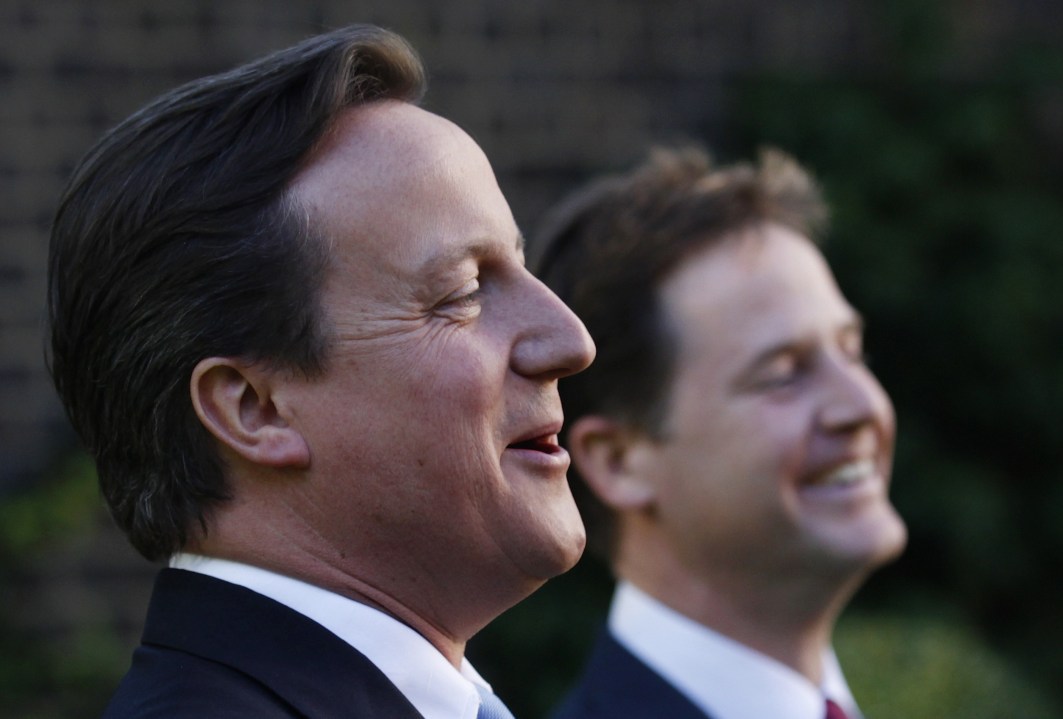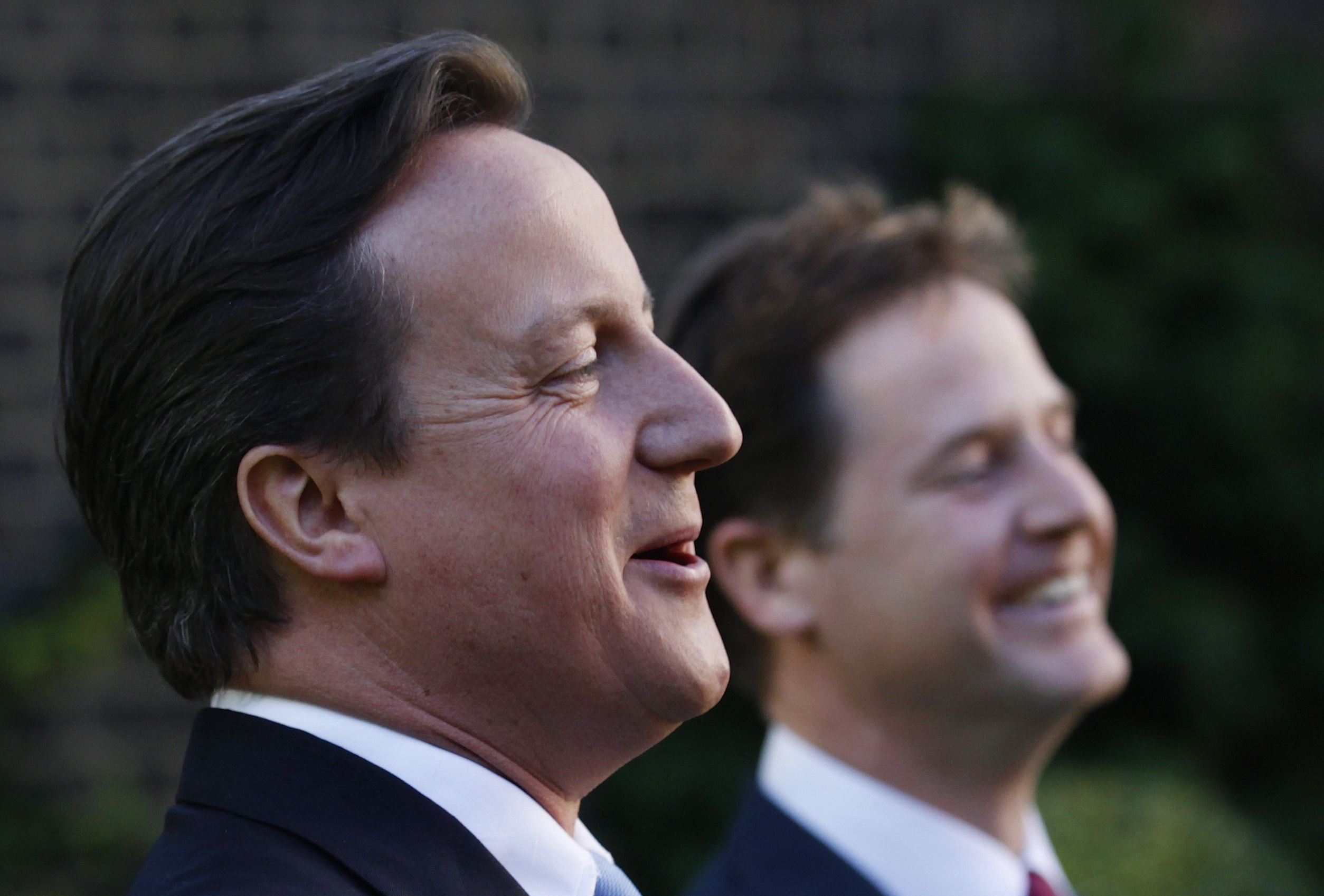 When the coalition was first formed, I expected it to collapse in months. But, then, I
was expecting the type of coalition that I’d seen in the Scottish Parliament when Labour and the Lib Dems kept their distance (and their mistrust). But what has emerged is a far tighter
coalition – and one that may even end up in a merger. Cameron has been very generous to the Lib Dems, in both Cabinet places and policies. But since then, he has just grown more generous. In
the News of the World today, I wonder if he’s playing for keeps.
When the coalition was first formed, I expected it to collapse in months. But, then, I
was expecting the type of coalition that I’d seen in the Scottish Parliament when Labour and the Lib Dems kept their distance (and their mistrust). But what has emerged is a far tighter
coalition – and one that may even end up in a merger. Cameron has been very generous to the Lib Dems, in both Cabinet places and policies. But since then, he has just grown more generous. In
the News of the World today, I wonder if he’s playing for keeps.
It was great to welcome Nick Clegg to The Spectator’s summer party last week, and the other Lib Dems who turned up to raise a glass to the return of fiscal sanity. He arrived with Cameron,
and anyone talking to both him and Cameron quickly realised that they were not faking it. Cameron is genuine when he talks about his trust in his deputy. Neither are tribal politicians, nurturing
innate loathing for the other. Both instantly turned their skills to bridge-building, and focusing on where they agree. I gather that Steve Hilton is positively jubilant about it, believing it
brings “permission” to ditch policies that were only there to assuage the right of the party and take the Tories further in a direction he has always wanted. It also fits a narrative
that the failure in the election is not due to his selling of the Conservative brand, but that the inherent weaknesses in the brand were too strong.
The idea of ditching the “nutty” 20 percent of the Tories and gaining another 35 percent of new members from the centre was the basis of the Ken Clarke leadership campaign. Not so much
with Cameron: his aim was always to make the public see the innate compassion and progressiveness of the Conservative message. But he is now comfortable – intellectually and emotionally
– in this coalition. He is not going to bed at night, dreaming about the moment he can ditch these dastardly Lib Dems and leave Clegg to the mercy of the Lib Dem voters (now 15 percent of the
total, down from 28 percent).
What puzzles me is why Cameron keeps giving to the Lib Dems. Why keep sending these post-nuptial wedding gifts? Like adopting the Lib Dem position on fewer prisoners (a position which Tories
enjoyed lampooning in the campaign). Like setting up a Clegg commission on House of Lords reform. Then there was the VAT increase in the budget, mainly needed to pay for extra tax credits requested
by the Lib Dems. And, most recently, earmarking May next year as a date for the referendum on the AV voting system. Sounds dull to the average voter, but to the LibDems it’s the greatest gift
and ultimate fantasy (Chris Huhne, for example, has just left his wife for an officer from the Electoral Reform Society)
There is an analysis emerging in Tory circles, which I suspect Cameron shares, that the era of majority governments is over in Britain. That coalition is the new future – which is why
it’s good to ensure the Lib Dem deal is built to last. The AV system would, of course, make this outcome more likely. I suspect it won’t be long before we hear Danny Finkelstein telling
us how AV is quite a good idea, and will benefit the Tories after all. If we’re so nice to the Lib Dems, they’ll put us No.2 on their preference list and that will help in Labour-Tory
marginals. He’s largely there
already.
Cameron’s unforced generosity towards the Lib Dems will certainly serve to cement the coalition. Chris Huhne, for example, is the bookies’ favourite to quit the Cabinet next. Vince Cable is second favourite. Both are from the left of the Lib Dems, but if they were to go
Clegg could say “Shoo. Go off on your own. I’ve achieved more Lib Dem goals in this coalition than you could ever have dreamed of – certainly more than Brown would ever allowed
us.” And he would be right. Cameron has behaved not cynically, but responsibly. He is not, as Harriet Harman once suggested, a man who would use a woman then dump her the next morning.
He’s acting as if he has got Clegg into trouble and is doing the decent thing. One cannot fault Cameron’s generosity or commitment to this coalition.
History suggests that the Lib Dems will be split by this coalition, and not the Tories. The party itself is utterly schizophrenic, as its annual conference reminds us. Any party that accommodates
Simon Hughes and David Laws cannot really claim to be much more than an umbrella group for voters annoyed that ‘none of the above’ is not an option on the ballot paper. The party has
never really been asked to choose a direction – and being in government does mean that it has to make that choice. It is possible that the leftish side of the Lib Dems does split off, as
Cable seeks to find material for a final chapter of his autobiography. And Cameron could seek to gobble up Clegg, Laws, Steve Webb, Danny Alexander – the part of the Lib Dems that can make
common cause with the strong liberal roots of the Conservatives.
So are we in this coalition beginning to see the beginning of the Liberal Conservatives? In my own case, I would certainly describe myself as a liberal – in the Manchester, not American sense
of the word. To me, the dividing line in politics is not so much between Labour and Tory but between those who place trust primarily in people and communities, and between those who primarily trust
the state. There are many Labour MPs in the right side of this dividing line: Frank Field, John Hutton, Alan Milburn, James Purnell, Jim Murphy. None of whom are likely to be actors in the
leadership contest. Michael Gove, Andrew Adonis (himself a former Lib Dem) and David Laws basically agree on an education agenda. The patrician Tories, who believe the benighted masses need
direction from an enlightened elite, are on the wrong side of this divide.
It could well be that Cameron is trying not just a coalition here, but a political realignment. As Labour’s leadership battle produces nothing but tribalistic clichés, Cameron may well
capture the public mood in so doing. He may also be protecting the Conservatives from reputational damage from the cuts. Mervyn King spoke for many when he warned that whoever implements these cuts will be out of power for a generation. The guilty party is being
called, by the unions, the “ConDems”. Not Tory cuts, but “ConDem” cuts. The allure of a pun has trumped their desire to taint the Tories. Result.
But Cameron is taking a risk. Tory members will be unsold on Hilton’s idea that the Conservative brand is beyond resuscitation, and many argue that a competent election campaign would have
produced a Tory majority. I don’t share Peter Oborne’s
prediction that the coalition is likely to collapse after the AV referendum, but agree that it is a major risk.
It was Eric Pickles who introduced the notion of the “love bomb” for the Lib Dems. This policy has continued into government, and it seems aimed at fusing the parties together far more
closely than continental-style (or even Scottish style) coalitions. The test of this, for me, will be whether Cameron puts Tory candidates against the likes of Chris Huhne. If not, then this
coalition will – in effect – have become a merger and the Liberal Conservatives will be born.
 Fraser Nelson
Fraser Nelson
Cameron's realignment of our party politics







Comments